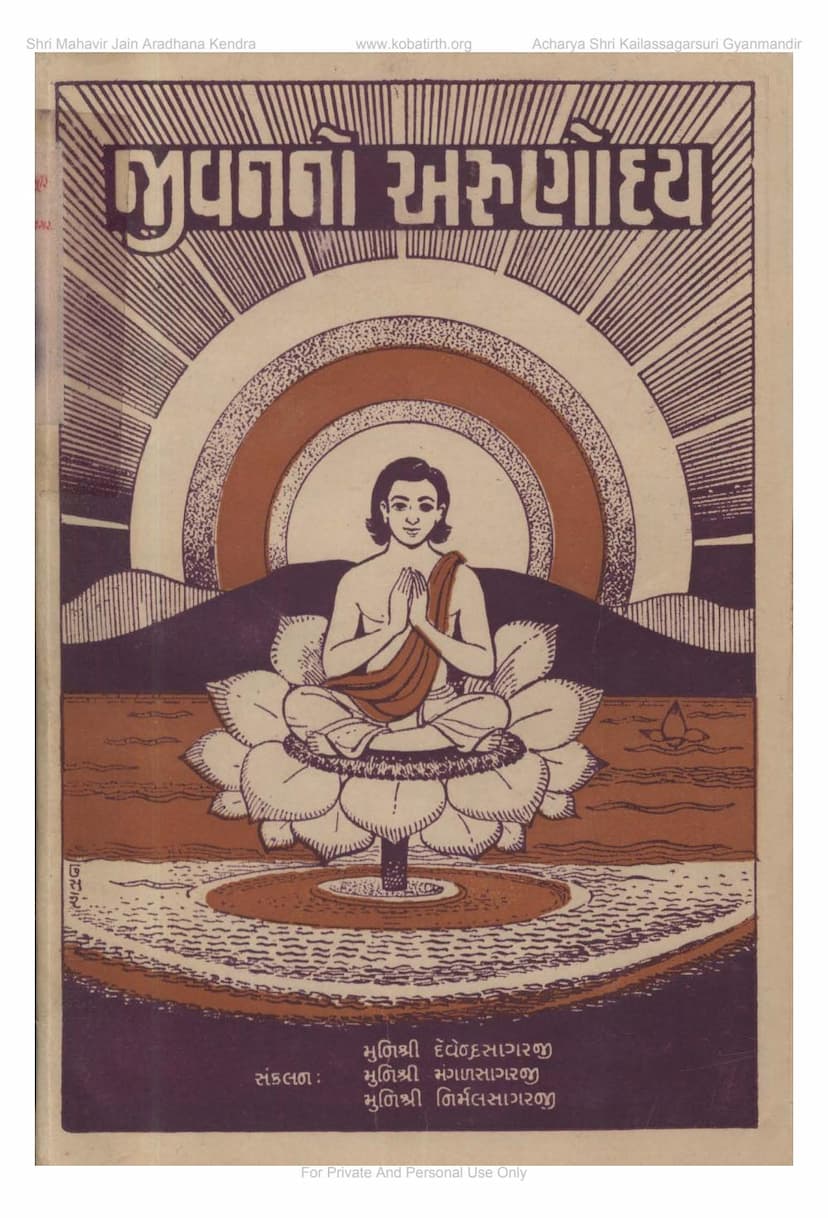Jivan No Arunoday Part 3
Added to library: September 2, 2025

Summary
This document is the third volume of "Jivan No Arunoday" (The Dawn of Life), a compilation of discourses by Acharya Shri Padmasagarsurishwarji Maharaj Saheb. The book was compiled by Munishri Devendrasagarji, Munishri Mangalsagarji, and Munishri Nirmalsagarji, and published by Shantilal Mohanlal Shah. It was released on November 1, 1978, coinciding with the Gujarati New Year.
The book focuses on various aspects of Jain philosophy and practice, aiming to guide readers towards spiritual upliftment and liberation. Key themes and topics covered in the text include:
- The Importance of Right Faith (Samyak Darshan): The text emphasizes that right faith, characterized by virtues like equanimity, conviction, compassion, and adherence to truth, is the foundation of spiritual progress. It draws parallels with the essence of the Tattvartha Sutra, highlighting that purity of faith leads to the purity of the soul.
- The Significance of Humility and Humility (Vinay and Laghuta): The book stresses that humility and considering oneself small are essential for spiritual growth. Pride is identified as a major obstacle, leading to downfall.
- The Power of Conduct and Virtues (Sheel and Virtues): Sheel (chastity/virtuous conduct) is described as the lifeblood of a person, essential for purity of thought and action. The absence of Sheel leads to suffering.
- The Fruits of Devotion (Bhakti): The text extols the power of devotion to the divine (Paramatma bhakti), stating that it is the best path to cross the ocean of worldly existence. Stories illustrate how unwavering devotion can lead to miracles and spiritual fulfillment, even surpassing the desire for worldly possessions or heavenly abodes.
- The Role of Knowledge and Action (Gyan and Kriya): It is emphasized that true liberation (Moksha) is achieved through the combination of knowledge and action. Knowledge without action is considered futile.
- The Significance of the Paryushan Festival: The book dedicates significant portions to explaining the importance of the Paryushan festival, a period of spiritual introspection and purification for Jains. It details the various observances, including:
- Temple Visits and Worship: Reverence for Jinendras and meditating on their virtues.
- Honoring Monks and Nuns (Munishri): Seeking blessings and learning from their exemplary conduct.
- Recitation of the Kalpa Sutra: This sacred text, containing the life of Lord Mahavir and the conduct of monks, is highlighted as a vital part of the festival.
- Fasting and Austerity (Tapasya): The importance of self-discipline and mortification of the body and mind to purify the soul.
- Acts of Charity and Compassion: Helping the less fortunate, practicing non-violence, and protecting living beings (Abhaydan).
- Forgiveness (Kshama): The ultimate aim of Paryushan is to seek and grant forgiveness, fostering universal amity. The concept of Samvatsari Pratikraman, a ritual of seeking forgiveness, is elaborated upon.
- The Twelve Vows of a Layperson (Shravak ke Gyarah Vrata): The text outlines eleven duties or observances for lay Jains, leading to spiritual development.
- The Power of Thought and Willpower: The immense power of thoughts and their impact on the universe and an individual's life is discussed. Positive thoughts and focused intentions are crucial for spiritual progress.
- The Importance of Pious Living: The book advocates for a life guided by truth, righteousness, and detachment from worldly possessions. It warns against the accumulation of wealth and the pitfalls of materialism.
- The Nature of the Soul and Liberation: The text delves into the concept of the soul (Atma) as eternal and distinct from the body. It explains that liberation is achieved by shedding karmic bondage and realizing the true nature of the soul.
- The Role of a Guru: The guidance and association of a Guru are considered invaluable for spiritual realization, likening their influence to a touchstone that transforms ordinary individuals into divine beings.
Throughout the book, the teachings are presented through stories, parables, and explanations of Jain principles, making the spiritual concepts accessible and relatable to the reader. The overarching message is to cultivate virtues, practice self-discipline, and strive for spiritual enlightenment.